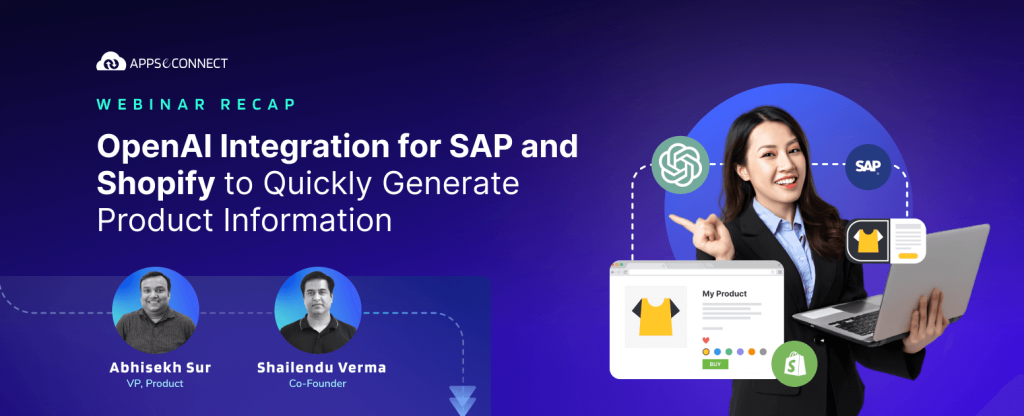In the ever-evolving landscape of eCommerce, businesses strive to captivate consumers with compelling product representations through engaging product descriptions and visuals for their imagination. In recent years, artificial intelligence has emerged as a game-changer, revolutionizing industries across the board. One of the most powerful and versatile AI technologies available today is OpenAI. Its language models, such as GPT-3, have proven to be transformative, offering businesses new opportunities to enhance their operations, elevate customer experiences, and unlock unprecedented levels of efficiency. Through OpenAI integration, businesses can incorporate its capabilities to generate text and visuals to create more engaging content with less effort. Implementing an OpenAI integration between an ERP and eCommerce such as between SAP and Shopify can enable enterprises to quickly generate product images and information to create a comprehensive eCommerce while improving their time to market.
To explore the webinar in detail, check out the recorded session below:
Why eCommerce Businesses Should Consider OpenAI Integration
In today’s rapidly evolving technological landscape, businesses continually seek innovative solutions to enhance their operations, gain a competitive edge, and deliver exceptional customer experiences. Integrating OpenAI’s language model and image generation capabilities can provide several significant benefits for eCommerce businesses looking to improve their operations. With an OpenAI integration, eCommerce businesses can leverage their innovative language and image generation technologies to accelerate their time to market and enhance their online customer experience by offering rich visual experiences and engaging product descriptions. Here are some reasons why they should consider OpenAI integration:
- Faster Time-to-Market: Implementing an OpenAI integration can automate the data entry process for various products on the eCommerce platform and help businesses improve their time-to-market. Generating product descriptions can be a time-consuming task, especially if there is a large inventory of products. With OpenAI Integration eCommerce businesses can leverage the power of natural language processing (NLP) to automate the process of creating product descriptions. For large product catalogs, the integration can offer the ability to generate descriptions in bulk, significantly reducing the time and effort needed to populate the Shopify store with compelling content.
- Automated Image Maintenance: High-quality product images also play a crucial role in attracting customers and highlighting products effectively. With the help of OpenAI Integration, businesses can potentially automate the creation of product images to enhance their online store. The integration can use AI-driven image composition techniques to combine product images with different backgrounds, settings, or models, providing a diverse range of visual presentations for the products. The OpenAI integration can also help generate consistent and eye-catching thumbnails for many products. The integration could automate the thumbnail generation process, ensuring that each product has an attractive and appropriate thumbnail for display in search results and category pages to offer a more engaging customer experience.
- Streamlined Product Attribution: The OpenAI integration can use its Natural Language Processing to analyze unstructured data sources, such as product descriptions from manufacturers or suppliers, user reviews, and other relevant content. By extracting key information from these sources, the model can identify essential product attributes like color, size, material, weight, dimensions, and more. Moreover, in cases where certain attributes are missing or not explicitly mentioned, the OpenAI integration can generate potential attributes based on context and patterns from existing data. This helps in completing the product information and making it more comprehensive.
- Effortless Multilingual Support: Through OpenAI, enterprises can facilitate the automatic translation of product text for multiple languages through its powerful natural language processing capabilities. By leveraging the language model’s understanding of various languages, it can efficiently translate and adapt product descriptions, features, and specifications from the source language to multiple target languages. The integration can ensure that the translations maintain the intended context and tone, enabling the eCommerce stores to effectively reach international markets without the need for manual translation services. This automation streamlines the process, saves time, and resources, and ensures consistent and high-quality translations, enhancing the global appeal of the products and broadening the customer base.
- Streamlines Management for Large Inventories: OpenAI integration can be beneficial for companies with many SKUs by reducing the time needed to set up a webstore. The integration can automatically extract and populate product attributes, descriptions, and specifications. This means that instead of manually inputting each product detail, the integration can handle the bulk of the data entry process. By automating these tasks, businesses can expedite the webstore setup process, save countless hours of manual labor, and swiftly launch their online presence with a comprehensive and well-organized product catalog. Moreover, the model’s ability to generate product content further enhances the efficiency of the setup, resulting in a polished and informative webstore that is ready to cater to customers in a fraction of the time it would have taken using traditional methods.
- Multilingual Webstore Support: Businesses can effortlessly run a multilingual webstore with an OpenAI integration. One of the most fundamental aspects of running a multilingual store is to provide product information in different languages. OpenAI’s language models can be employed to automatically translate product descriptions, specifications, and other relevant details into various languages, making it easier for customers from different regions to understand the offerings. The integration can also allow the eCommerce store to dynamically switch between languages based on the user’s preference or detected location. This means that when a customer visits the website, they can automatically see the content in their preferred language if available, providing a seamless experience. Thus, by incorporating OpenAI’s powerful language processing capabilities into an eCommerce store, businesses can efficiently manage and maintain a multilingual presence, ensuring a more inclusive and user-friendly shopping experience for customers from diverse linguistic backgrounds.
OpenAI Integration for SAP and Shopify to Generate Product Information
While AI has become a buzzword across the industry in recent times, many enterprises fail to fully comprehend the advantages of an OpenAI integration with other lines of business applications can offer. Through a ready integration of OpenAI with an ERP and eCommerce application, businesses can drastically improve the customer experience of their webstore by generating detailed product descriptions, attractive product images, and support for multiple languages. With greater insight into how these advantages can offer greater benefits to businesses, APPSeCONNECT recently conducted a webinar, titled, “OpenAI Integration for SAP and Shopify to Generate Product Information.”
The major topics discussed throughout the webinar included the following:
- How OpenAI integration can improve Return on Investment (ROI)
- A highlight of a real-world use case scenario for OpenAI integration
- Live demonstration of OpenAI Integration with SAP S/4HANA and Shopify
- Showcase the benefits offered by the OpenAI integration
- Live Q&A session
The webinar was conducted on the 27th of July 2023 and presented by Mr. Shailendu Verma, Co-Founder of APPSeCONNECT, and Mr. Abhishek Sur, VP of Product from the same organization. The webinar focused on exploring the immense possibilities and advantages of incorporating OpenAI integration specifically for SAP S/4HANA and Shopify platforms. These industry experts shared valuable insights, delving into the potential benefits that businesses can unlock by harnessing the power of OpenAI technology. Attendees gained a deeper understanding of how this integration could revolutionize customer support, product information translation, multilingual capabilities, personalized recommendations, and other critical aspects of their eCommerce operations. The webinar served as an invaluable resource for businesses seeking to optimize their operations and stay ahead in the ever-evolving landscape of eCommerce with the aid of innovative AI technology.
OpenAI Integration for SAP and Shopify to Quickly Generate Product Information – Q&A
Some of the major questions brought up and answered during the webinar include the following:
Q1. Can OpenAI be used to get product reviews or feedback?
A. Yes, if a product is publicly available and is reviewed by someone, then the ChatGPT engine can pull that information through an API and publish it directly on the platform.
Q2. What are the use cases of AI for integration?
A. Some of the use cases already discussed included product description completion and image generation. Another use case where AI can be used during integration is for the prediction of inventories for those products.
Q3. What are some of the learnings that be shared regarding AI integration?
A. With AI becoming available as a service, people can now implement the technology for their products. However, AI is not robust enough yet to replace a human thus, discretion is required regarding the content generated by it. A disclaimer should also be present to inform users that the content is AI-generated. Moreover, AI can draw information only from the public domain and information that is not readily available cannot be used by the AI.
Q4. What are the integrations that APPSeCONNECT supports?
A. APPSeCONNECT offers a vast library of integration packages for ERP, eCommerce, CRM, and online Marketplaces.
Team APPSeCONNECT would like to express our gratitude to all those who joined in on the webinar and made it a successful online seminar. For those who were unable to participate in the live session, you can view the recorded version below:
You can also check out the webinar in detail through the slideshow below:
APPSeCONNECT stands as a pioneering, low-code Business Process Automation (BPA), and integration platform, delivering smooth and comprehensive end-to-end automation solutions for enterprises. Boasting an extensive repository of pre-configured integration packages, businesses can promptly and effortlessly set up all necessary integrations without hassle, facilitating accelerated business growth through faster time-to-market and seamless scalability. By embracing APPSeCONNECT’s automation capabilities, enterprises can chart a course toward a future defined by greater scalability and substantial growth. Start your journey towards unmatched business efficiency and effectiveness today with APPSeCONNECT.
Looking to get started with automation for your SAP S/4HANA and Shopify platforms? Then seamlessly connect both applications under a single, intelligent, and secure Business Process Automation platform through APPSeCONNECT’s robust SAP S/4HANA and Shopify integration packages and achieve exponential business growth.






















